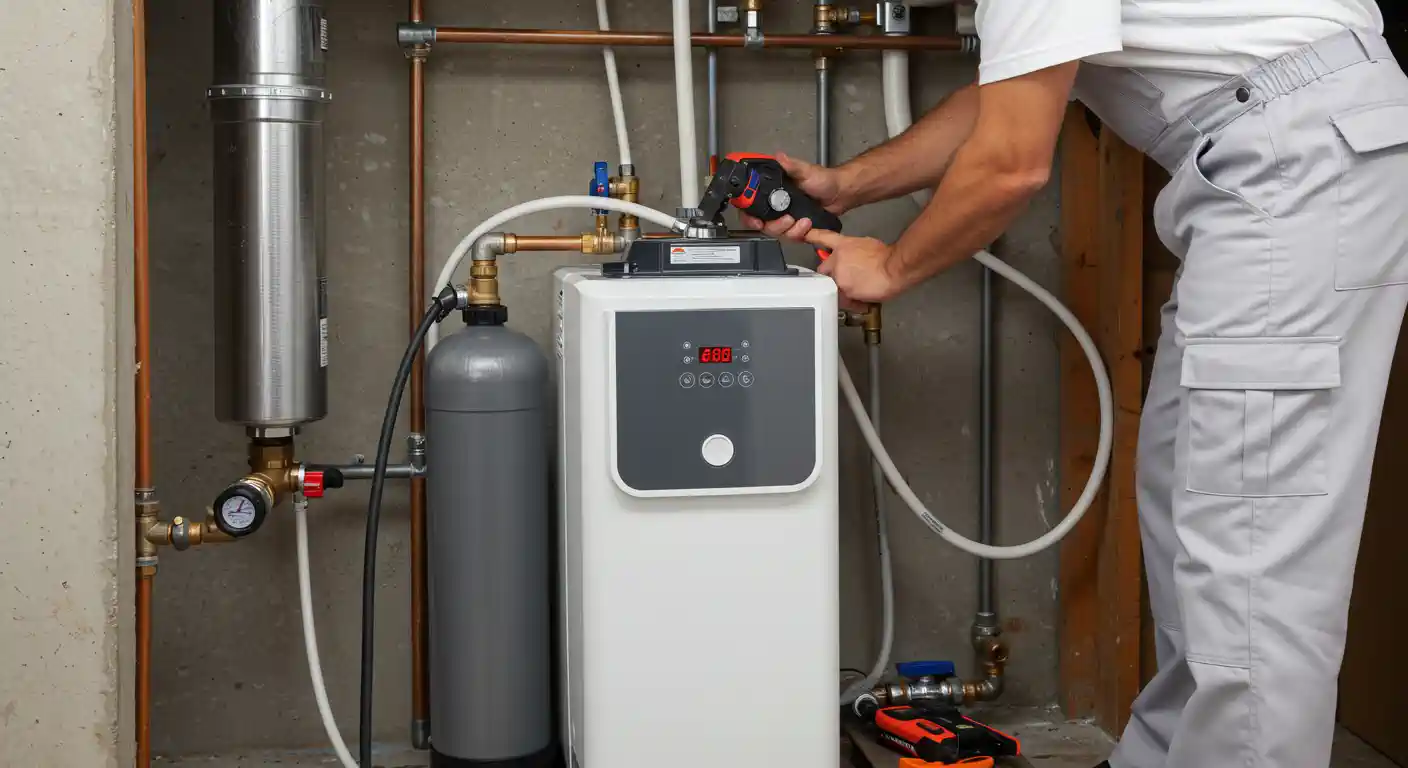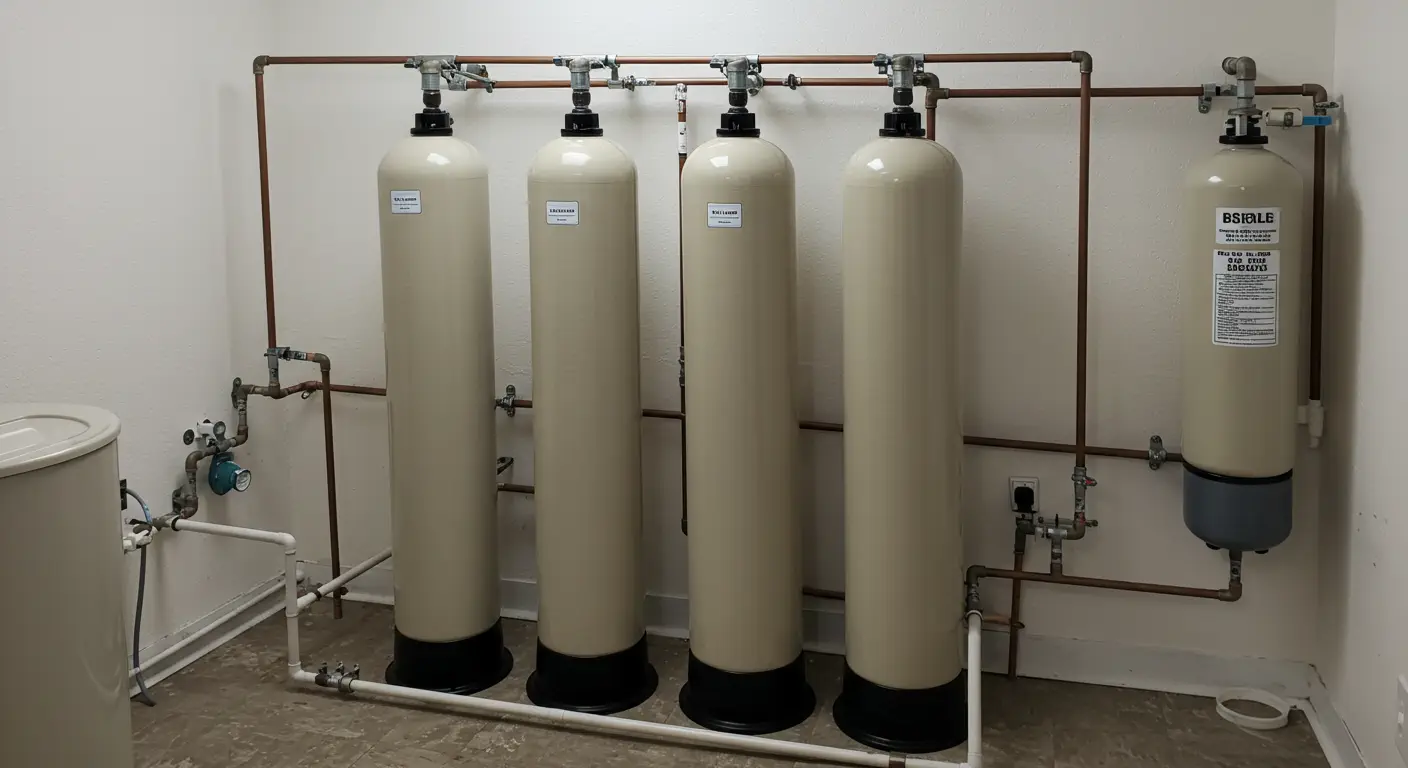Water Softener Installation in Fairfax City, VA
Many homeowners in Fairfax City, VA, encounter issues related to hard water. Hard water contains high concentrations of dissolved minerals, primarily calcium and magnesium. While generally safe to drink, these minerals can cause a variety of problems throughout your home, affecting everything from your plumbing system to your appliances and even your personal care routine. Recognizing the signs of hard water is the first step towards finding a solution, and often, that solution involves the installation of a water softener.

Understanding Hard Water and Its Effects
Hard water originates from the ground, where water picks up minerals as it flows through rock and soil layers. In areas like Fairfax City, the geological composition often leads to water with significant mineral content. The effects of hard water are often noticeable in daily activities.
One of the most common indicators is the presence of mineral buildup, known as scale, on fixtures, showerheads, and faucets. This scale appears as a white, chalky residue and can be difficult to remove. Over time, this buildup can restrict water flow and potentially damage fixtures.
Inside your pipes, hard water minerals can accumulate, narrowing the pathways for water and reducing water pressure. This internal scaling can eventually lead to costly pipe repairs or the need for a full plumbing repipe if left unaddressed over many years.
Appliances that use water, such as dishwashers, washing machines, water heaters, and coffee makers, are particularly susceptible to the damaging effects of hard water. Mineral deposits can form on heating elements and internal components, reducing efficiency, increasing energy consumption, and shortening the lifespan of the appliance. A water heater repair might be needed sooner due to scale buildup inside the tank or on the heating element.
Beyond plumbing and appliances, hard water impacts personal use. Soap and shampoo do not lather as effectively in hard water, requiring more product for the same result. The minerals can leave a film on skin and hair, leading to dryness, irritation, and dullness. Laundry washed in hard water may appear dingy, feel stiff, and colors can fade more quickly. Dishes may come out of the dishwasher with spots and streaks, even after a wash cycle.

How a Water Softener Works
A water softener is a specialized filtration system designed to remove the excess minerals that cause hardness. The most common type of water softener uses a process called ion exchange. Inside the softener's main tank are small resin beads, typically charged with sodium ions. As hard water flows through this tank, the positively charged calcium and magnesium ions are attracted to the negatively charged resin beads. In exchange, the sodium ions are released into the water.
This process effectively "softens" the water by replacing the hardness minerals with sodium ions, which do not cause scale buildup or react with soap in the same way. Periodically, the resin beads become saturated with calcium and magnesium and need to be regenerated. Regeneration involves flushing the resin tank with a brine solution (saltwater). The high concentration of sodium in the brine solution forces the calcium and magnesium ions off the resin beads, and these minerals are then flushed away, typically down a drain. The resin beads are recharged with sodium ions, ready to soften more water.
Benefits of Installing a Water Softener
Installing a water softener installation system offers numerous advantages for homeowners in Fairfax City:
- Extended Appliance Lifespan: By preventing mineral buildup on heating elements and internal components, water softeners help water-using appliances run more efficiently and last longer, reducing the need for frequent repairs or premature replacement.
- Reduced Plumbing Issues: Soft water significantly reduces scale accumulation inside pipes and fixtures, maintaining consistent water pressure and potentially preventing clogs or the need for pipe leak repair caused by corrosion accelerated by hard water deposits.
- Lower Energy Bills: Appliances like water heaters require less energy to heat soft water because there is no insulating layer of scale on the heating element. This increased efficiency can translate to lower utility costs.
- Brighter, Softer Laundry: Clothes washed in soft water come out cleaner, brighter, and softer. Detergent works more effectively, requiring less product, and colors are less likely to fade.
- Cleaner Dishes and Fixtures: Soft water eliminates spots and streaks on dishes and glassware. It also prevents the stubborn scale buildup on faucets, showerheads, and shower doors, making cleaning easier and less time-consuming.
- Improved Personal Care: With soft water, soap and shampoo lather better, and rinsing is more effective. This leaves skin feeling smoother and hair looking shinier and healthier. Less soap and shampoo are needed, saving money over time.
- Environmental Benefits: Using less soap and detergent reduces the amount of chemicals entering wastewater. More efficient appliances also consume less energy, contributing to a lower carbon footprint.
The Water Softener Installation Process
While the benefits of a water softener are clear, proper installation is crucial for optimal performance and longevity. This is not typically a DIY project, as it involves working with your home's main water supply and plumbing system.
The installation process generally involves several steps:
- Assessment: A qualified plumbing professional will assess your home's plumbing system, determine the best location for the water softener (typically near the main water supply line entry point and a drain), and consider factors like pipe size, water usage, and water hardness level to recommend the appropriate size and type of softener.
- Preparation: The main water supply is shut off, and the plumbing where the softener will be installed is prepared. This may involve cutting into pipes to create the necessary connections.
- Plumbing Connections: The water softener unit is connected to the main water line. This includes connecting the inlet pipe, which brings hard water into the softener, and the outlet pipe, which carries soft water to the rest of the house. A bypass valve is typically installed, allowing water to bypass the softener if maintenance is needed.
- Drain Line Installation: A drain line is connected from the softener to a suitable drain location (like a floor drain or standpipe) to discharge the wastewater generated during the regeneration cycle. This line must be installed with an air gap to prevent potential backflow contamination.
- Brine Tank Setup: The brine tank, which holds the salt used for regeneration, is placed near the softener unit and connected via a small tube.
- System Startup and Testing: Once all connections are made, the water supply is turned back on, and the system is checked for leaks. The softener is then programmed according to the household's water usage and hardness levels. The professional will run an initial regeneration cycle and test the softened water to ensure the system is functioning correctly.
- Homeowner Guidance: The installer will explain how the system works, how to add salt to the brine tank, and any basic maintenance the homeowner should be aware of.
Why Professional Installation is Essential
Attempting to install a water softener without the necessary skills and tools can lead to significant problems, including leaks, improper operation, or damage to your plumbing system. Professional installation ensures:
- Correct Sizing and Placement: Experts determine the right size of softener for your home and the ideal location for efficiency and accessibility.
- Proper Plumbing Connections: Secure and watertight connections are made, preventing leaks and ensuring the system functions correctly.
- Compliance with Codes: Professional installers are familiar with local plumbing codes in Fairfax City and ensure the installation meets all requirements, including air gap standards for the drain line.
- Optimal System Performance: The unit is programmed correctly based on your specific water conditions and usage patterns, maximizing its effectiveness and efficiency.
- Reliability and Warranty: Professional installation often ensures the validity of the manufacturer's warranty and provides peace of mind knowing the job was done right.
For homeowners in Fairfax City dealing with hard water, investing in professional water softener installation is a step towards protecting their home's plumbing and appliances, improving water quality for daily use, and simplifying household chores.
Invest in Cleaner, Softer Water Today
Hard water doesn't have to be a permanent inconvenience for homeowners in Fairfax City, VA. Whether you’re tired of scale buildup, rising energy costs, or the effects on your skin and clothing, a professionally installed water softener system offers a long-term solution that delivers noticeable results across your home.
From extending the life of your plumbing and appliances to improving personal comfort and reducing energy and soap consumption, the benefits speak for themselves.
Take the first step today—schedule a water hardness test and consultation with a licensed plumber to learn which water softener system is right for your home. Enjoy the peace of mind that comes with clean, soft water every day.
Trusted Brands.
We partner with industry-leading manufacturers to ensure your plumbing system runs on durable, high-quality parts built to last.


















Customer Testimonials
Cherry Blossom Plumbing has consistently provided top-notch service, ensuring every issue is resolved efficiently and professionally.

Service Areas
Proudly serving Arlington and the surrounding Virginia communities with fast, reliable plumbing solutions you can count on.




